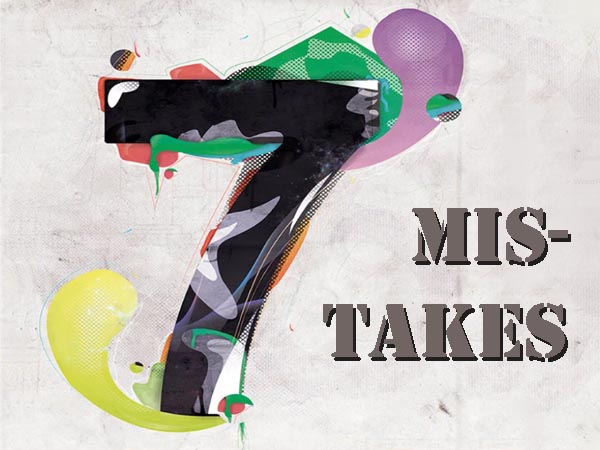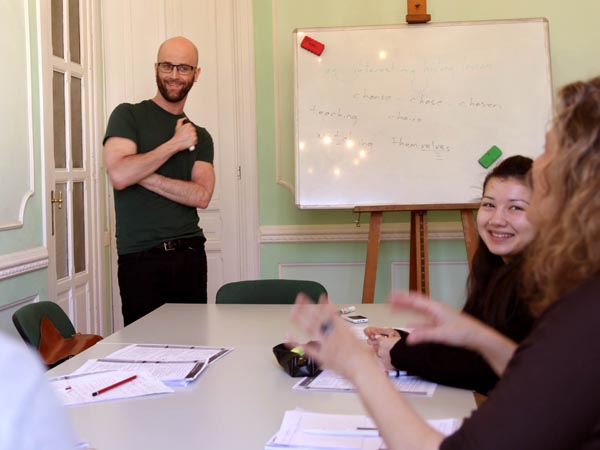Is it difficult to learn a new language?
Many of us would love to be able to speak another language. As young children, we have the capacity to learn and speak infinite languages; each of us, it seems, has an inbuilt language-learning system, a necessary tool to help us build relationships, share ideas and express ourselves.
To English speakers, a language like Mandarin may seem impossible to learn, and yet babies born in China all learn to speak it within their first few years. There’s no such thing as a difficult language; granted, as adults, the language-learning muscle does become a little stiff, but we each of us still have that childlike capacity, if we can only learn to unlock it.

Trying to learn a language is one thing, learning it in an efficient way is another.
Children learn through immersion and by experiencing vocabulary and grammar through their contents, not by revising tables of verb endings in a stuffy classroom!
If you’re thinking of learning a new language, you may be overwhelmed by that challenge and find upon researching it that you’re bombarded with conflicting information. Put aside what you think you know about learning a language; we’ve crafted a list instead of what NOT to do.
Here are 7 deadly mistakes to avoid making when you learn a new language.
1. Irregular Practice.
We’ve all heard the age-old saying that practice makes perfect, and while it might be tedious to hear it again, when it comes to language there really is no faster way to improve than simply by practicing. It feels great once you’ve mastered the pronunciation of a particularly tricky word, but it’ll all be for nothing if you don’t practice your new skills regularly. By attending regular social activities in your chosen language, you will inadvertently practise your skills, building your vocab and polishing your grammar simply through living out your life – as children do.
2. Classroom Mentality.
One of the most detrimental things to language learning is unfortunately the very approach through which many of us are taught. When we’re taught a new language at school, it seems that none of the aspects of childhood learning are applied to the teaching methods. Instead, it becomes a school subject like any other, regimented and based on learning the facts off by heart, before reciting them ad nauseum. This really is just a waste of your time; without contextual learning and, more importantly, an enjoyment in the process which can only come from immersion. Forget the grammar books and the endless vocab lists; learning a language can’t and shouldn’t be learned effectively in the classroom, which leads on to our next point…

3. Not Speaking Enough.
It can be tempting, especially in the early days of learning a new language, to avoid tackling the speaking element as much as possible and just focus on perfecting your writing and reading skills. However, remember that as children we learn by listening and then repeating; we hear our parents and peers make sounds and learn to associate objects and ideas with those sounds. As our skills become more sophisticated, we learn to differentiate tenses and the relationships between words. Not once during this process is it ever suggested that we start trying to read or learn the different cases by name. Have you ever heard a 3-year-old talk about adverbs or the ablative case? Thought not!
Having the courage to practice speaking will help you learn much faster and more effectively, as well as helping to develop your own conversational style and find your voice in your new language.
4. Not Focusing on the Bigger Picture.
You don’t have to move abroad to experience immersion in your new language. Sometimes one of the things that can get in the way of learning a new language is to pay attention to the nitty gritty details. Languages are incredibly complex structures; imagine that every language is a tree, with branches and subbranches, leaves and buds all leading off in different directions, all of different ages. You can’t possibly expect to understand all the intricacies of this tree – even experienced native linguists would struggle to completely comprehend every little anomaly, inconsistency or broken rule that occurs in every single language. Start small, try and enjoy the process and be kind to yourself – progress is progress!

5. Wasting Time with Unhelpful Tools.
Life can be hectic, and it can sometimes seem like you don’t have time to pick up new skills – especially a commitment as long term as learning a new language. This is reason enough to avoid wasting time with unhelpful tools. Flashy online programs, classes and books that promise to provide a ‘quick fix’ or to teach you a language on your own in a set amount of time are nearly always a waste of your time, and your money. Instead, take activities in your chosen language that, rather than making grand promises, involve meeting native speakers or other budding linguists. Language is learned socially, and there is no quick fix.
6. Not Setting Goals when you learn a new language.
It’s not uncommon to feel overwhelmed when trying out a new language. One of the best ways to tackle the initial jitters is to set out a set of goals to help motivate yourself through the highs and lows that naturally come with the process. Take control of the situation by setting yourself goals ranging from small ‘(I’m going to attend a language-related event at least once a month’) to big (in 6 months I want to be able to hold a conversation with a native). Another positive way to approach language learning is to really ask yourself why you want to the learn the language, and what would you do differently if you could speak it? Once you’ve set yourself on a learning path that is rooted in a place of positivity, there will be no stopping you!
7. Expecting Too Much Too Soon.
You didn’t learn your first language in a day – so why do you expect it to be super-fast this time round? Don’t be a perfectionist when it comes to speaking and trying out new pronunciations or grammar, and don’t be embarrassed about speaking imperfectly. As long as you’re trying and testing things out in a relaxed environment, you will pick things up over time and soon be the competent linguist you long to be.
Start learning your new language today!
Now you know all the mistakes to avoid when learning a new language, it’s time to start focussing the positive steps you can take to start your linguistic journey today. You might have been thinking about improving your language skills for a long time. But have you done something about it, except for thinking about doing something about it? Don’t procrastinate!
At the English Academy we want to help you rediscover the language-earning ability from your childhood. Attend fun and engaging activities and social events in the language you want to learn and help build your confidence and proficiency in a relaxed yet effective learning environment.
